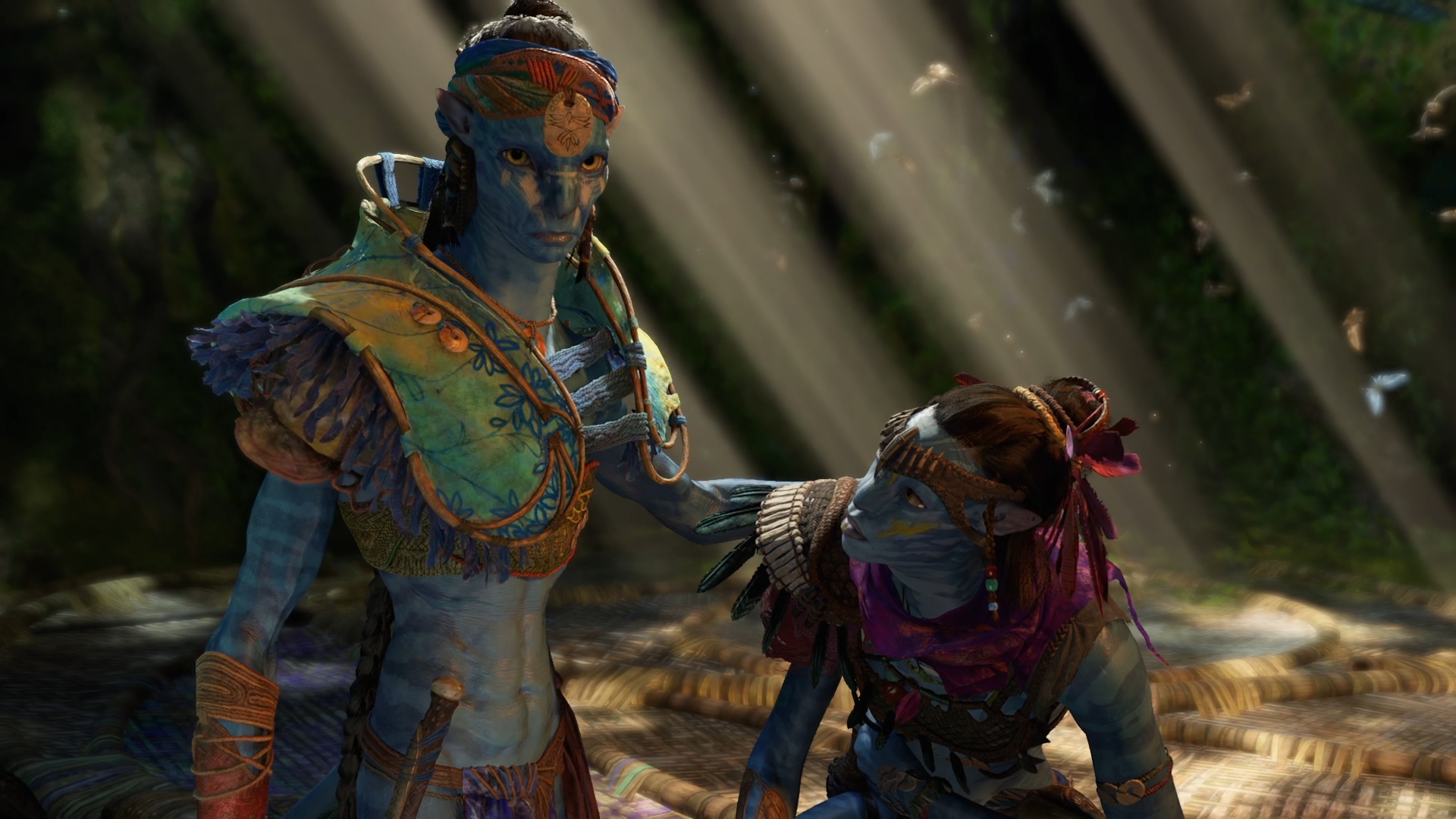A few minutes into my Frontiers of Pandora demo session, a viperwolf interrupts my exploration of the overgrown ruins of an RDA colonial outpost. I kill it with an arrow as it snarls at me. I approach and press the harvest button, watching with confusion as my na’vi character kneels, offering a prolonged prayer of thanks to this fellow child of Eywa—the collective lifeforce of Pandora. As I’m mashing buttons, the rest of the viperwolf pack closes in. The nearest predator pounces.
I’m jarred out of my prayer animation and have to fumble off another arrow as the game’s clumsy attempt at a somber moment evaporates. When I swap weapons the scene turns into outright parody: The big, blue hands that were just raised in reverence for the cycle of life now pull out a military-issue assault rifle and punctuate the absurdity by spraying rounds into the terrified pack of animals. My second kill is too damaged by gunfire to harvest. My na’vi, conspicuously, doesn’t pray for that one.
Avatar: Frontiers of Pandora promises a firsthand Avatar experience delivered with a kind of breathless awe. After three hours, that promise already feels thin. Instead of awe, Frontiers of Pandora captures the feeling of someone tugging your sleeve to say, “Look, it’s like in Avatar!” And then you feel guilty because they’re watching to see whether you’re excited, so you say, “Oh. Yeah, cool,” before turning your attention back to all the Far Cry stuff that’s happening.
If you’re wondering just how Far Cry it is: It’s pretty Far Cry.
My demo session had me roaming an open map of story quests and side activities, mercilessly purging RDA (that’s the Resources Development Administration) outposts and encampments to reclaim Pandoran territory. It’s a genre pairing that makes intuitive sense; going in, I even thought some of my complaints about recent Far Cries might help the experience if they showed up here. Far Cry 5 felt like it had too much happening—like I couldn’t walk 10 meters down the road without getting jumped by a cougar seconds before an ambush by a pickup truck full of human firearm catalogues. If there’s anywhere I’d want to be repeatedly clubbed over the head by constant encounters, it’s in an alien ecosystem that’s pitched as overflowing with strange, majestic life.
It was odd, then, to walk away from Frontiers of Pandora feeling like it wasn’t packed with much of anything, alien or otherwise. It does, however, have Far Cry 6’s loot game trappings. As I gathered materials and waged guerilla warfare for the na’vi clan in the demo region, I was rewarded with Eywa’s greatest gift: incremental gear score upgrades.
Where the wild things aren’t
Limited in the demo to wandering around the Kinglor Forest region, I was surprised to find myself struggling to cross paths with any wildlife, only making a handful of sightings in my three hours of exploring. The absence was stark enough by the end of my session that I wondered if I’d broken something. But before then, here’s what I tallied during my trek:
Another pack of viperwolvesTwo deer-like feline creaturesA moth that I shot with an arrow because my crosshair turned red, only to feel immediate guilt after realizing it was probably one of the moths that the local na’vi rely on for silk ( apologies to the Aranahe clan)A sort of horned, cow-like lizard thing that I kind of remembered from the one time I saw Avatar in 2010. This one had an RDA dart stuck in it, which I removed after soothing it through our mutual connection to the great web of being (I held the square button to make “easy there” hands at it)
If I’m in an alien biome, I’m there for the creatures. But when I flicked on my na’vi vision hoping it’d highlight some fun beasts to look at, what it usually highlighted was plants. Evolutionary biology on Pandora has one love, and it’s gimmick-based plant life I didn’t always know how to interact with or why I would bother. Some were obvious: plants with fruit to pick for cooking, sticks for refilling my arrows, or retractable Lift Vines and bounce-pad leaves to help with traversal. More, however, were glowing mysteries in my na’vi senses without any button prompts or apparent uses. I came hoping to be wooed by majestic wonders of the Pandoran wilds, and was rewarded with plants I might be able to interact with, someday. Probably?
It felt like a missed opportunity—like the lush environment was weirdly lifeless. More disappointing was that, for a franchise built on the merits of gratuitous visuals, the Kinglor Forest wasn’t as captivating to look at as I might’ve hoped. Frontiers of Pandora is certainly graphically competent; the lighting tech and sheer environmental density were impressive. It just wasn’t very interesting. The plants are a bit bigger, a bit more bioluminescent, a bit more pink. But if I squinted past the occasional floating island, it didn’t feel very different from any simulated Earth forest, particularly during daylight.
I’m sure some of you are thinking: “But this game lets you fly your very own ikran. Surely he was moved by the raw delight of flying his very own ikran!” Rest assured: after googling what an ikran was and remembering that it’s Pandora’s take on a pterodactyl, that’s where I figured the demo’s best shot was, too. Its questline led me to a long platforming ascent up a floating island chain, a na’vi NPC waiting along my path to offer encouragement by describing how strong—how sacred—the bond is between ikran and its chosen, worthy rider.
The sacred bond between ikran and chosen rider, it turns out, is forged by holding the square button three times. Checkmate. Bond forged.
(Image credit: Ubisoft)
Immediately the ikran feels fluid and responsive in flight, and the added sense of scale and panoramic views mean Frontiers of Pandora looks best from the air. But it doesn’t sustain a sense of wonder that the game implies it should. Over the length of my demo session, my ikran quickly became a vehicle I’d point at my destination and fly in a straight line until I arrived.
If there were moments where the demo shined, it was in combat in RDA outposts. I was playing as a three meter tall, warbow-wielding cat alien—my arrows hit their targets with enough force to shatter mech canopies and knock soldiers airborne, and there were times the game was able to translate that impact with satisfying visual feedback. Unfortunately, combat can also rely on highlighting enemy weak spots with your na’vi vision, which paints big, bleary smears across your screen. Whether or not that’s enough to sustain the experience will depend on how you feel about Avatar going in.
If you can’t get enough na’vi, you’re probably already on board. If you had your fill of na’vi by 2010 or walked out of Way of Water filled with regret, let me just say: Far Cry: Primal lets you throw clubs at enemies while riding atop a sabretooth tiger and is frequently on sale for $7.50. Draw your own conclusions.
In the time I spent with it, Frontiers of Pandora felt like it was operating under the assumption that I’ll be enchanted simply because it’s Avatar. For some, that’ll be true—for most of us, I don’t know that na’vi alone are enough.
Avatar: Frontiers of Pandora releases December 7, 2023.










